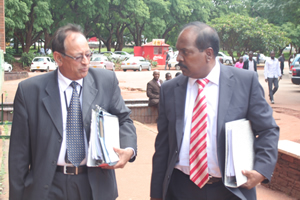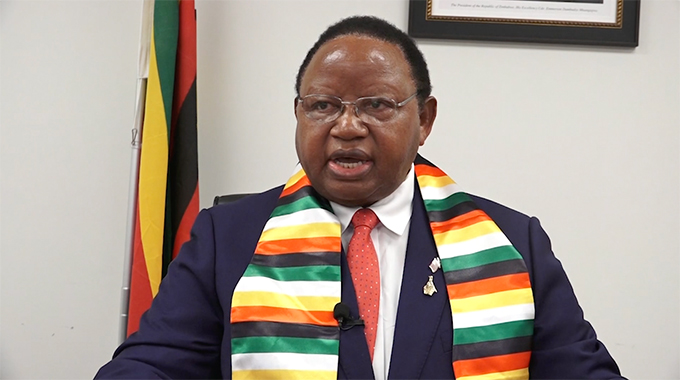The Warriors and the ZIFA curse
predominantly in the boardrooms.
There was a time when the drama came on the field.
But you have to go back almost 20 years for that when Reinhard Fabisch was still our national coach and when a home game for the Warriors was guaranteed 60 000-plus fans at the National Sports Stadium.
When Agent Sawu would somehow find that killer instinct, deep in the closing minutes of a tight game, and get the connection right to power a header past the Cameroon goalkeeper to give us a priceless 1-0 victory that will remain embedded in the hearts and minds of everyone who was there.
When Benjamin Nkonjera, diminutive in frame but a giant in soul, would turn on a majestic performance, in the heart of the Warriors’ midfield, and overshadow a Cyril Makanaky still getting rave reviews around the world after an impressive World Cup show for the Indomitable Lions.
When Ephraim Chawanda would rise, like the Rock of Gibraltar, to marshal the defence with a ruthlessness that suffocated the opponents and provided the ultimate protection for Bruce Grobbelaar and give us a foundation on which we would build our search for victory.
When Peter Ndlovu would slalom past the Bafana Bafana defence, with the skill and grace of a ballet dancer, and – with the finishing touch of a trusted gunslinger – plunge the dagger into the hearts of the visitors and their fans with a goal for the archives.
When Fabisch would command us to sing, because he wasn’t hearing the noise from the stands, and we would all react together as one united family, filling the giant stadium with our war cries and sending shivers down the spine of the visitors and injecting a wave of energy and refreshment into the bodies of our Warriors.
When football was played on the lush fields of our Theatre of Dreams, where the Pharaohs and the Indomitable Lions were slain, and our dreams, more often than not, used to come true and we would never lose, even in foreign territory like the French city of Lyon where we bravely held the Egyptians to a goalless draw.
But things have changed now and most of the drama is coming from the boardroom and very little from out of the field of play.
This week the boardroom drama reached fever pitch when a Zifa meeting to review the Warriors performance in the failed 2012 Nations Cup campaign came up with a landmark resolution to blacklist all players, fingered in the Asiagate scam, from playing for the Warriors until their cases had been determined.
Zifa president, Cuthbert Dube, and two of his board members, Elliot Kasu and Benedict Moyo, attended that indaba that was also graced by Norman Mapeza.
The instruction to Mapeza, from Zifa on Monday, was that the coach should not consider any of the 80 players, listed in the Asiagate Report as participants in the games that Zifa believe were manipulated by match-fixing agents, until each and every player had been cleared by an Independent Ethics Committee set up to bring the case to a close.
On Tuesday, confirmation was obtained from Zifa chief executive, Jonathan Mashingaidze, and from Moyo, that such a decision had been passed and the list of the 80 players was duly published in this newspaper on Wednesday.
Later that day, we spoke to Zifa president Dube and he said reports that they had effected a blanket ban on the 80 players were not true and only three players – Method Mwanjali, Nyasha Mushekwi and Thomas Sweswe – would not be considered for the game against Burundi because, in his view, their performance in Cape Verde was below par and suspicious.
Dube, though, said should the Independent Ethics Committee find all the 80 players guilty, they would all be barred from playing for the Warriors.
On Thursday, the story changed again when Dube released a statement in the evening saying that all the 80 players mentioned in the report remained blacklisted from playing for the Warriors until their pending cases, to be determined by the Independent Ethics Committee, had been resolved.
Amid all that drama, news also filtered through on Thursday night that Henrietta Rushwaya, the former Zifa chief executive, had also been arrested by the Anti-Corruption Commission in a case linked to the Asiagate scandal.
Everything was happening in the boardroom.
When The Drama Came From The Field
Back in the days when the drama came from the field of play, and not from the boardroom, we had a national team that famously came within 11 minutes of qualifying for the ’94 Nations Cup finals and 90 minutes of making it to the ’94 World Cup finals.
Kalusha Bwalya destroyed our dreams for a place at the Nations Cup, with a smash-and-grab goal, his first headed effort in international football, for a priceless equaliser that dumped us and took the Zambians on the plane to Tunisia where they finished second behind eventual Nations Cup winners, Nigeria.
A biased referee, whose decisions were so diabolical Fabisch had to wave American dollar bank notes in his direction implying that he had been bought by the Cameroonians, destroyed our World Cup hopes in Yaounde where we fell 1-3.
But there was no questioning that the wrong team went to the ’94 World Cup finals and, if the fading Indomitable Lions had used a referee in their backyard to boost their cause, there was no hiding place for them in the open fields of the United States and, in one game against the old Soviet Union, they conceded six goals in a humiliating defeat.
Back in those days, when the Warriors represented and fulfilled our dreams, something happened that has a similar ringing tone to the boardroom drama that has dominated our football in the past week.
On 10 November ‘94, our goalkeeper Grobbelaar was accused by the British tabloid, The Sun, of match-fixing during his time at Liverpool for the benefit of both his personal finances and an Asian betting syndicate.
Apparently, The Sun obtained video footage of Grobbelaar discussing match-fixing with his former business partner, Chris Vincent, and on that video, and the subsequent interviews they carried out with Vincent, their story was based.
It was an exclusive scoop and it vibrated across the entire world in an era when Facebook and Twitter were not yet part of us.
Soon Wimbledon goalkeeper, Hans Segers, Aston Villa forward, John Fashanu, Malaysian businessman, Heng Suan Lim, and Grobbelaar, were charged with conspiracy to corrupt and were dragged to court in a high-profile case.
Despite those allegations, Grobbelaar and Segers were allowed to continue playing, while Fashanu retired from playing less than a year after being charged.
Grobbelaar also continued to play for the Warriors and, in the week that The Sun published their exclusive story, the maverick ‘keeper flew to Harare for a Nations Cup qualifier and, on the same plane, were scores of British journalists following every move that he made.
There were banners, everywhere, at the National Sports Stadium that Sunday, with the Zimbabwean fans showing their outpouring of support for Grobbelaar with most of the banners saying: “Grobelaar Is Innocent.’
Every touch by the colourful ‘keeper was cheered loudly by the partisan home crowd.
The British journalists covering that match, looking for that mistake that could support the story that Grobbelaar was a match-fixer, looking for that poor show that would confirm that the case was having a huge impact on his career, were disappointed as The Jungleman turned on a stellar show.
We all backed Grobbelaar because we believed in him and, crucially, the Zifa leadership then also backed The Jungleman and, in those 90 minutes of intense scrutiny, the ‘keeper passed his test with flying colours.
He found a lot of inspiration that his entire nation was behind him and, with a spring in his step, Grobbelaar pleaded not guilty to the charges.
After two successive trials, in which the jury could not agree on a verdict, Grobbelaar, Segers and Fashanu were cleared of the charges in November ‘97.
Grobbelaar later sued The Sun for libel and was awarded £85 000.
The Sun appealed and the case was taken to the House of Lords where it was found that, although the specific allegations had not been proved, there was enough evidence of dishonesty.
The House of Lords slashed his libel award to a nominal £1, the lowest libel damages possible under English law, and ordered him to pay The Sun’s legal costs estimated at £500 000.
Grobbelaar was unable to pay the costs and was declared bankrupt.
He continued to play the game long after this case.
When The Drama Comes From The Boardroom
This week Zifa decided that players, whose names were fingered in the Asiagate Report, should not be called for any national duty until their degree of participation, which translates to either being found guilty or innocent, had been determined.
We have to applaud Zifa for trying very hard to clean their house and, sometimes, to do that you need a streak of ruthlessness.
It’s not an easy process and it comes with a lot of baggage that has to be cleared and a lot of very unpopular decisions have to be made.
But I feel Zifa’s heavy-handed approach to the players is possibly not the best way to bring to an end this Asiagate saga that has hovered over our football for some time now.
You can’t adopt a blanket approach to such a sensitive issue that is a matter of life and death for the players.
Crucially, Benedict Moyo, who was the secretary of the committee that compiled the Asiagate Report, has conceded that their report is not fool proof.
It means there are elements in that report, including the innuendos it casts on some players that they were guilty, which cannot be backed up by evidence.
To blanket every player, simply because he happened to be on that plane and played in a match that Zifa have deemed suspicious, is not only dangerous but clearly a severe assault on the freedoms that we are supposed to enjoy as human beings.
You have to back every accusation with evidence and, in such matters of corruption, such evidence include video material, paper transfer, bank accounts that suddenly showed suspicious huge deposits and sting operations like the one carried out by the News of the World on the Pakistan players.
While Zifa have to be given the benefit of doubt that all the matches were questionable, something they have to prove since the onus is on them to do so, accusing everyone who played in each and every match of being corrupt is a wild accusation.
If we go by Zifa’s formula of handling Asiagate, then Pakistan would not have a cricket team today simply because there was match-fixing when they last toured England.
But, in the Pakistan case, it’s the three culprits who were getting the corrupt payments who were punished, not the entire team, and we have all seen how Pakistan have rebounded from that incident to become the best performing team in Test cricket today.
If we go by Zifa’s formula that once there is suspicion, on a trip, then everyone on that plane is guilty, then what happens to that match in Cape Verde, which Mashingaidze has told us has a lot of grey areas to suggest that it could have been fixed?
Will Zifa apply the same formula to everyone who travelled on that trip?
You can’t have one formula for these people and another formula for those people, an Animal Farm set-up where all animals are equal but some animals are more equal than others.
Zifa are asking the players to now come up and clear their names with fresh submissions, which is tantamount to the exercise carried by Gumede and his team being done afresh.
And, and if that is the case, then where are we getting the starting point that there is reasonable case that can be built that all the 80 players acted corruptly to such an extent they cannot play in the national team?
It’s Zifa that has a case against the players, claiming that each and every player in that group of 80, is guilty and they have to prove their innocence.
The onus is on Zifa to prove that, indeed, the players are guilty.
Two years ago, when this exercise started and players were being asked to come for interviews with Gumede and his team, there was a marked reluctance on the part of many players to come and present their cases.
To get the players to play to their tune, Zifa threatened that any player who did not come forward to be interviewed would be barred from playing for the national team.
There were even assurances given by some board members that an amnesty would be extended to players and, in such a culture of evidence gathering, you tend to get all sorts of stuff, including a lot that cannot be supported by facts.
But the landscape has changed significantly and Fifa have made it clear that all players who are found guilty will be banned and, with careers on the line, it will be interesting to hear the versions that will come out without that artificial fallback position offered by the association two years ago.
Two years down the line, after the players had presented their cases, they are also being barred from playing for the national team until they come forward and present evidence, to the Zifa chief executive or some board members.
In two years, it appears, we have come full circle, but never moved an inch, and all that we have is the belief within Zifa that the matches were corrupted, all the players were corrupted, all the officials were corrupted and all the journalists who accompanied them were corrupted.
Zifa can do whatever they want with the national team, because they control it, and they need to be supported when they say that the Warriors cannot be a team that is graced by corrupt people.
What is significant here is to prove the corruption and it’s something that is in short supply right now and the unfortunate players find themselves being used for the grandstanding by an association desperate to make its point.
CAPS United Show The Way
At least, even in an era where everything appears going wrong for our football, there are some people who are providing a silver lining and CAPS United showed the way this week with their acquisition of a double-storey property that they intend to turn into a clubhouse.
Now, that is what football should be all about.
CAPS United fans have waited for a long time for the championship and this year marks the seventh year since the Green Machine last celebrated lifting the biggest prize on the domestic football scene.
A lot has happened during that time and it’s a fair analysis that CAPS United have lost a lot of the golden touch that made them the big force that dominated the domestic scene in 2004 and 2005, with a good run in 2004 where they only lost once at home and did not lose any game on the road in the league.
Disillusionment has crept into their fans and a militant section of those supporters have clashed with a number of coaches and their management on a number of occasions.
But while CAPS United have not been blessed with a lot of trophies in the past six years, they have maintained their professional way of running the club and their latest investment is testimony of the vision that its leadership has for a modern professional football team.
Of course, a club house doesn’t win trophies but it gives you a sense of belonging and, crucially, the assurance to the fans that the leadership is in it for the long haul and the CAPS United project is not about to go the Kiglon or Amazulu way.
CAPS United have to be patient because they are doing the right thing, no doubt about that, and it’s only a matter of time before they are repaid for their vision.
Sometimes you only wonder about the kind of super football club that this country would have produced if CAPS United, with this kind of astute management, were backed by the same huge support base that backs Dynamos.
Or, alternatively, you wonder about the kind of super football club that this country would have produced if Dynamos, with the huge support base that they have, if they were led by the kind of astute management in charge of the Green Machine.
FC Platinum, who play their debut Champions League tie in Swaziland in two weeks time, have a date against a Botswana team BMC at Mandava today as part of their preparations for the continental campaign.
They have already spent a week camped in Kariba.
In contrast, Dynamos have spent the whole week in a crisis where the players are refusing to train while the management claims there is no money to meet the financial obligations being demanded by the players.
Hopefully, everything will be sorted out soon because you get a feeling this is not the way a double-winning squad should be treated.
And, hopefully, too, Highlanders will get the kind of leadership that can restore the Bosso brand to where it used to be when it was ithimu yezwe lonke.
Come on United !!!!!!!!!!!!!!!!!!!!!!!!!!!!!!!!!!!!
!!!!!!!!!!!!!!!!!!!!!!!!!!!!!!!!!!!!!!!!!!!!!!!!!!!!!!!!!!!!!!!!!!!!!!!!!!!!!!!!!!!!!!!!!!!!!!!!!!!!!!!!!!!!!!!!!!!!!!!!!!!
Chicharitoooooooooooooooooooooooo
oooooooooooooooooooooooooooooooooooooooooooooooooooooooooooooooo!
Text Feedback – +263772545199
Email – [email protected]
Skype – robson.sharuko10
You can also interact with ROBSON SHARUKO on Facebook and Twitter.






Comments